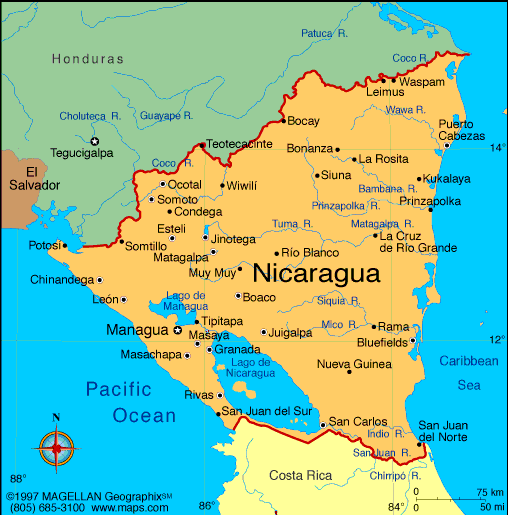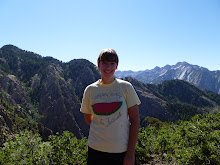If you were stuck on an island for two years what is the one thing you would bring?
In the past I would have had very different answers, but after (almost) a month and a half in Nicaragua, I have to confess it would be my headlamp. I apologize sincerely to all of those who I might have poked fun of in the past. After both the late night latrine visits and frequent power outages I’m a believer.
Really though, I am going to be living on the Island of Ometepe for two years! I’m still honestly in a bit of a shock, I never ever imagined that is where I’d be, but I am warming up to the idea.
The island of Ometepe is usually the classic vista you imagine when you think of Nicaragua. It’s a large island in the middle of Lake Nicaragua which is the largest fresh water lake in the Americas. It holds more than 500 different island. Two large volcanoes are located in the middle of the island.. one is dormant, one not so much.. Apparently the island has landed on the shortlist for the new seven natural wonders of the world.
I’ll be in the small town of Altagracia on the Volcán Concepción side which is less developed. It’s the original indigenous capital of Ometepe with a population of 2500 in the immediate town.
I’ll be visiting the site to meet the teachers I’ll be working with this next week, and I’ll come back with a full report after or send a message in a bottle to keep you updated.
In the mean time, some light reading material..
http://vianica.com/nicaragua/ometepe
http://www.ometepenicaragua.com/altagracia/index.php
Thursday, June 30, 2011
Sunday, June 26, 2011
Pocos Photos
Estrellita, my neighbor
another glamor shot
These are actually parasites that grow on the power lines but look like birds nests.
The brown part is a cashew nut, but you can also eat the fruit. All of this for one nut!
Mountain of Avocados
Sandinista Office
This was a Hipica in Masatepe. Each town has its Fiesta Patronale which often means a horse parade with drunk riders and often drunk horses unfortunately. This fine chica was an exception.
Thursday, June 23, 2011
Does this work?
https://mail.google.com/mail/?ui=2&ik=1932c38dbc&view=att&th=13095be5c3aad50d&attid=0.1&disp=safe&realattid=2e9c85c663ef5787_0.1&zw
This is a link (I hope it works) to Va Pue the newsletter put out by Nica volunteers. If anyone wants to know more about Laurel's house, she wrote a great article on the benefits of plastic bottle structures. If it doesn't work let me know and I'll find a way to get it up.
This is a link (I hope it works) to Va Pue the newsletter put out by Nica volunteers. If anyone wants to know more about Laurel's house, she wrote a great article on the benefits of plastic bottle structures. If it doesn't work let me know and I'll find a way to get it up.
The Harvest
Last week I traveled up to the small town of Tonalá, Chinandega for my volunteer visit. I was able to see what volunteer life is actually like.. training at times can feel a bit like a bubble, but I guess that’s why they call it training. I had the pleasure of staying with a volunteer named Laurel who built her own house out of plastic bottles! I know it’s crazy!
As a business volunteer, we will be teaching Entrepreneurship classes in public high schools. In addition to teaching in the immediate area, most volunteers also travel to very rural areas. On the way to the institute in Puerto Morazan the bus ride was bumpy but beautiful (they have one paved road in the area which was completed two years ago). Once in Puerto Morazan, we had to cross a bridge which just so happened to be out for the week. So, in Peace Corps fashion, we decided to scale the bridge to find half way through that they started painting the bridge. Walking through the village with green hands and feeling accomplished, we arrived at the school to find that many of the teachers hadn’t even showed up for class that day. If anything, this trip taught me about the importance of patience.
From the school, we walked about a mile and a half to a local shrimp cooperative made up of 16 women that was started about 20 years ago. For some reason, in my mind I’d always pictured a dark factory with dirty pools containing shrimp, and I’m not sure exactly where this image came from. However, I found serene “pilas” set amongst a backdrop of of volcanoes, greenery, and grass huts. So much care was taken in ensuring that the environment was natural and kept as clean as possible. I know that if I was a shrimp, I’d like to live there.
The co-op, along with 5 others, is currently under contract with a large Spanish seafood company, and there seem to be a number of other seafood processing companies in Chinandega. Laurel is working with the women as one of her secondary projects. They are creating a business plan so that they will at some point be able to be independent.
Lucky for me during my stay they were planning on harvesting the shrimp. We headed out (scaled the bridge again) and watched the harvest from 6 p.m. until 2:30 in the morning. We sat in silence amazed and watching every second. There was something really genuine about the process from the six light bulbs hanging on a string to provide light to the sound of the shrimp jumping inside the red plastic crates. During their eight and a half hours of work, the workers took one break for a piece of bread and cup of instant coffee. They would harvest for two more nights until the pilas were drained.
I’m trying to describe every detail because my camera (of course) quit working the same day. If only I could paint more than stick figures or blobs. My Dad had a “moose moment” when we were on a trip out west years ago. To this day he still regrets not having a camera. This might have to be my “moose moment”.
Following the conclusion of the harvest for the night, we made our way down stream in the pitch black. After dropping off the giant turquoise containers packed with ice and shrimp to the processing plant, we hitched a ride on a truck, and finally found ourselves hiking home from the front of town.
Saturday, June 11, 2011
Culture Shock
Lately, I’ve noticed that I’m confused pretty much all the time. This is due, partly, to the fact that I don’t speak great Spanish (yet) but gradually I’ve become confused even in my English conversations. Arriving in country, I thought I had almost everything figured out. I knew what my role should and shouldn’t be in my host community. But, I find myself forming a new opinion on something every day. While I know this means I am learning a lot, it makes things especially confusing.
Two weeks into training, my Honeymoon phase with Nicaragua began to disintegrate. I was having a hard time feeling any connection with either my host family or community. Because I was having a hard time, I gave myself an even harder of a time. Was it the bacterial infection I contracted from eating ceviche in the park? Besides being physically ill, I was emotionally exhausted. Why was I having these feelings? I am living in Nicaragua, this is a dream.
Later in the week, I found Dr. Oberg’s article, “Culture Shock and the Problem of Adjustment to New Cultural Environments”. I found myself fitting the description. In the months leading up to my departure, I would casually skip over anything remotely mentioning culture shock. My reasoning?I’ve traveled to third world- I’m open-minded. I won’t have to deal with culture shock. That only happens to close minded people.
Yeah, I visited third world. During these trips, I felt that I identified with the culture, but I realize now that I always knew deep down I’d be able to leave it behind in a matter of days or weeks. While these experiences were emotionally stimulating, I remained in my safe bubble. In my experience in Nicaragua, however, I am unable to separate myself from the community, because I realize that this is a reality for the people of this community. This is their life. In fact, I am expected to become part of this community to get anything done.
At the same time I started feeling pangs of cultural rift, I began to hear common stereotypes of Americans. Thinking of myself as anything but a typical American these descriptions of the pushy, consuming, results driven American appalled me. I soon found that my culture shock came less from the revelation of Nicaraguan culture but the realization of how engrained my own culture is in me. While everyone tells me different, there are some things I think I’ll never get over here. It breaks my heart that the entire town smells of smoke at all times because everyone burns their trash and I will never enjoy eating rice sandwiches.
I, humbly, post this because I think it’s a very real part of this whole experience and something future volunteers should be prepared for. I also believe that it will most likely be one of my biggest challenges over the next two years. Pero, Estoy accustumbrado.. But, I’m getting accustomed.
Subscribe to:
Posts (Atom)











